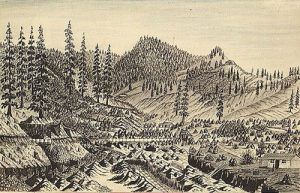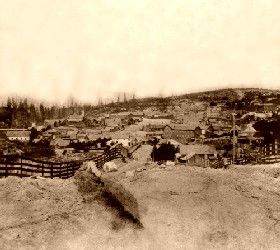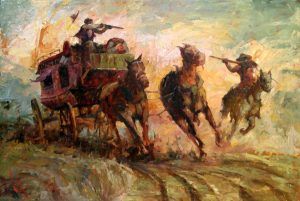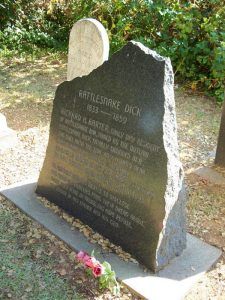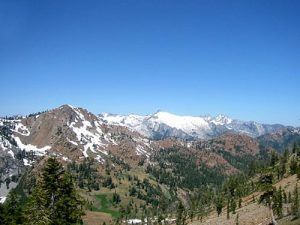Richard Barter, also known as Rattlesnake Dick and Dick Woods, was a California outlaw who stole horses and robbed mining camps.
He was born in Quebec, Canada, in 1833 to a British army officer and his wife. Though little is known of his early history, he was said to have been a reckless sort of boy. When he grew to adulthood, he was described as standing almost six feet tall, weighing about 160 pounds, and, though slight of build, very muscular.
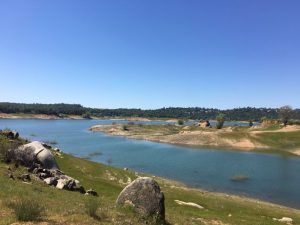
Rattlesnake Bar, California, courtesy All Trails.
After his parents died in about 1850, he, his brother, his sister, her husband, and a cousin immigrated to the United States and joined a wagon train to Oregon. They first settled in Sweet Home, Oregon, near Corvallis. Soon, Dick, his cousin, and his brother headed south to join the California Goldrush. They made their way to Rattlesnake Bar on the American River in Placer County, but all the claims had already been staked, so they worked for other miners for a while. It was here that he earned the nickname “Rattlesnake Dick.” A year later, Richard’s brother and cousin returned to Oregon. However, Barter was confident that he would make a gold strike and stayed. Failing to find gold the legitimate way, he soon turned to horse rustling, and in 1853, he was convicted of grand larceny and sentenced to a year at San Quentin.
After he was released, he hooked up with outlaw Tom Bell’s gang and participated in a string of horse thefts, robberies, and killings in California’s mining country. Following Bell’s death in 1856, Rattlesnake Dick took control of the gang and continued their outlaw ways.
In 1856, Barter learned from a drunken mining engineer that large gold shipments were being sent down Trinity Mountain from the Yreka and Klamath River Mines. Dick then sent George Skinner and three others to intercept the gold shipment packed on mules. George and the other bandits stopped the mule train outside Nevada City, California, holding the muleskinners at gunpoint. Meekly, the men turned over $80,600 in gold bullion to Skinner and his men without a shot being fired.
The bandits then made off with the shipment to keep a rendezvous with Barter and Cyrus Skinner at Folsom. However, George Skinner found it impossible to take the heavy gold shipment down the mountain passes without fresh mules. Soon, he split up the gold, burying half of it in the mountains.
Making their way to Auburn, the outlaws were intercepted by a Wells Fargo posse, and a gunfight ensued. In the melee, George Skinner was killed, and his confederates fled. The lawmen recovered $40,600 of the stolen loot, and though they searched diligently, they failed to find the remaining $40,000.
In the meantime, Rattlesnake Dick and Cy Skinner weren’t at the rendezvous point in Folsom, as they had just been jailed for stealing mules. When they were released, Barter immediately sought out George Skinner to obtain his share of the gold shipment, only to find that Skinner had been killed. Cy Skinner and Barter then spent the next several weeks searching for the buried gold before finally giving up.
The outlaws continued their crimes, including the February 1857 burglary of a Wells Fargo safe in Fiddletown and the robberies of three stagecoaches in a heist worth more than $30,000. Huge rewards were issued for the arrest of the bandits, but the gang continued to evade law enforcement. Dime novels soon dubbed Richard “Rattlesnake Dick” Barter as “The Pirate of the Placers.”
Rattlesnake Dick was captured and brought to justice several times, but he repeatedly managed to escape custody. In 1858, he was caught trying to escape from an Auburn prison while awaiting trial. Reluctant to return to San Quentin, Dick repeatedly filed for a continuance, delaying his court date. Finally, he was able to escape and sought to avenge his capture. He camped all night outside Sheriff John Craig Boggs’s house, but the lawman wasn’t home and didn’t return while Barter was there, so he left a threatening note pinned to the sheriff’s front door.
Barter and Cy Skinner were soon back to robbing stagecoaches and relieving muleskinners of their loads of gold coming from Nevada City, but their luck ran out. On July 11, 1859, a posse, consisting of Undersheriff George C. Johnston, Deputy Sheriff W. M. Crutcher, and Deputy Tax Collector George W. Martin, caught up with Dick and Skinner on a stage road near Auburn. The outlaws shot their way out of the ambush, killing George W. Martin and wounding Johnston’s left hand.
Both Barter and Skinner were wounded but escaped. Barter’s body was found the next day outside Auburn with two bullets in the chest and a third in his brain. Rather than be imprisoned again, he finished the job with a self-inflicted shot to the head. A note scrawled in pencil was found in his gloved hand that read, “If J. Boggs is dead, I am satisfied.” He would have been unhappy to know that his lawman nemesis lived until 1909.
Cyrus Skinner was captured and given a lengthy prison sentence.
Rattlesnake Dick Barter terrorized the Sierra foothills for over three years, from 1856 to 1859. He is buried at the Old Auburn Cemetery in Auburn, California.
The mule-train robbery gold taken by Barter’s gang in 1856 and hidden in the Trinity Mountains, near Redding, has never been recovered. Forty thousand dollars in gold still awaits its finder, but the search would be difficult in the vastness of the more than two million-acre Shasta-Trinity National Forest.
©Kathy Alexander/Legends of America, updated November 2025.
Also See:
Sources:
Auburn Journal
Find a Grave
Nash, Jay Robert; Encyclopedia Of Western Lawmen & Outlaws, Da Capo Press. 1989

